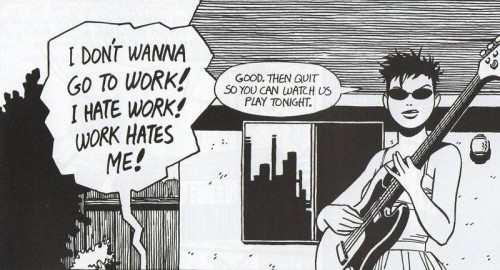an excessive pointlessness beyond terror and despair: why do i write
today i was thinking, ‘why do i write things.’
i don’t know what the answer is. i mean, at least in general. i write things on this blog because i feel like it’s an outlet that forces me to concretize, to some extent, theoretical implications of things in life like experiences and books and movies instead of just letting the ideas float around in my head where they eventually either fizzle out or find their way on twitter or end up via some twinned form in poetry or fiction or whatever it is that i’m calling my own ‘writing’ at the moment. i could write things for my own personal blog but the fact that htmlgiant has a built-in audience (whereas any attempt at a personal blog i make doesn’t), sort of, i don’t know, provides the motivation to make myself deal with my own thoughts.
like does that make sense? i don’t get paid to write here, as far as i know none of the contributors do. i’ve basically stopped submitting stories and poems to journals in the last year, yet i still post here. i’m sort of wondering why that is. i mean, the idea of someone else reading your own words makes it feel like more of a utile activity, writing that is, i guess. it’s a particular kind of egotism, or narcissism. but really i often feel more of an obligation. i don’t mean to a public, or to an audience, rather, like i said above, the idea of ‘people’ actually reading my hazily constructed ideas on art and literature and whatever-the-fuck i end up posting about here, i think, makes me actually try to think harder about what it is that i’m writing. obligation in that sense. like: don’t be totally fucking stupid and absent here, otherwise someone will call you out on your bullshit.
the obtusity of that sentiment is bullshit in its own right; no one in the entire world is obligated to pay any attention to me or to call me out on my bullshit. i’m tired of ideas of fame because i don’t think they make any sense.
READ MORE >
Sunday Service: Austin LaGrone Poem
When the Victim has Collapsed & Cannot be Lifted
The matchstick lady dances in a bowl of fire.
“Fire” –So very American, writes Larry Levis.
Casual and therefore exalted over angels, writes
Hermes Trismegistus. I’ve been thinking
about Tabitha. Her baby seals and black
pepper. The way she jimmies the diaspora
of the least fetching bishop and huddles
coldly in the back pocket of the Oldsmobile.
I want to poke her with a cheap umbrella
beneath a mutual communion of stars.
Yep, you’ve seen it coming for a long time,
the crescendo arrives like a blue rhinoceros,
horn aflame. And death, death wears a nice tie,
picks up the check, combs over a few greasy
strands of hair like a man with many watches.
Austin LaGrone is the author of Oyster Perpetual (Lost Horse Press, 2011). He lives in Brooklyn and teaches at John Jay College.
Let’s give away NOTHING, by Blake Butler. Three copies, courtesy of me/Sator Press. Comment with your email address to enter. Winners picked soonish. If you want: talk nightmares.
Modern Submission Convenience
We just finished our first workshop in my fiction class and now my students and I are talking about revision and what students should consider, if and when they choose to submit writing to literary magazines. I want to make clear to my students that publication isn’t what they should be thinking about right now but I still want them to start to understand what it means to submit work, receive editorial feedback and face rejection or acceptance. Most of the students are, understandably, intimidated by the submission process and what it means to put their work out into the world. Hell, I’m still intimidated by the submission process. For newer writers, it is hard to grasp what editors really want. It’s hard to break yourself of the mindset that you need to worry about what editors want. I went over some of the basic etiquette of submitting–address the proper editors, spell their names correctly, don’t explain your story, don’t ramble, proofread your work, read it aloud, proofread it again, research the magazines where you’re sending your work, read the magazines where you’re sending your work, and more than anything, make sure you’re submitting writing that matters.
When I first started submitting work, there was a ritual to it. I’d print a story out on my dot matrix printer and tear off the perforated edges dotted with tiny holes. I’d consult my Writer’s Market, write a cover letter, address a return envelope affixed with enough postage for a response and send off a story I now know had no shot in hell of ever being published by the likes of those glittery magazines I foolishly hoped would love my work. I am not nostalgic for that time. It was pretty terrible. I did learn, though, that becoming a published writer required patience and effort and sometimes that effort was secretarial.
Reading Comics: Peter Tieryas Liu on 100 Bullets
Welcome to the fourth installment of my new series: Reading Comics. I’m excited to report that I’ve got a bunch of great contributors lined up, and am myself working on a few entries. If you haven’t contacted me yet, but would like to participate, email me and let me know! Without further ado….here’s Peter Tieryas Liu…

100 Bullets are 100 issues packed with graphic brutality, tales of moral compunction, and the evolution of noir into a merging of both crime fiction and pseudo-history. Every gunshot exposes frailties in the cracks of a society pining for justice. The premise of the comic goes something like this. You’re the victim of an unforgivably heinous crime. Down on your luck, the mysterious Agent Graves informs you that the cause of all your suffering is Person X. He offers you an attaché case filled with a gun and 100 untraceable bullets that you can use in any way you want without legal repercussions. What would you do?
Reflections from a Shiny New Creative Writing Teacher
I’m writing this in between grading my (first ever!) students’ second poems. I’ve been teaching for about a month.
One of the first things I learned about teaching: grading takes an ungodly amount of time. There are several steps, which include:
1. Excitedly read through first batch of student poems on the bus home from class.
2. Read poems at home.
3. Read poems aloud to roommate (also a teacher) to make sure you’re not missing something.
4. Write comments on poems in pencil.
5. Worry comments are too prescriptive.
6. Erase comments and try again.
7. Agonize about putting numbers on poems.
8. Briefly consider flaunting university guidelines and not grading poems.
9. Put numbers on poems.
10. Reread poems and compare grades.
11. Hope students read comments instead of just staring at their grades.
Yesterday I finally got a chance to read Dennis Cooper’s superlative interview in the new Paris Review. If you haven’t read it yet, you should treat yourself.
One thing that struck me was at the beginning when Dennis explains that he got interested in literature because he read an interview with Bob Dylan where Dylan mentioned Rimbaud. I had a similar experience in that I came to literature through Jim Morrison. I wonder how many other people found their way to books through musicians?
Glow-Rally: Kim Chinquee
They all wanted Cokes and the grandma said a beer please, and the boy’s father went and ordered, delivering while the pins clinked and banged and rattled.
Another train ride, and here I am with your goddamn strawberry lotion.
She tried to hide her breath, said she had a good day.
The lights were on and so I knocked and then the lights were off.
She was healthy and her laughter proved it, her laugh was like a cluck, like the chickens she used to feed, watch hatch, then butcher.
“What do we do with him when he’s dead?”
“She loved God,” the chaplain said. He was getting wobbly on the drum.
Later, lunch at Denny’s, we talked about what to do with the lorazep, trihexphen, risperidone, fluoxetine, the haldol in the lock box.




